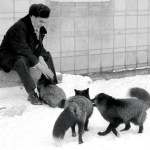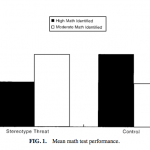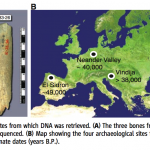genetics
Most of you don't understand evolution. I mean this in the most charitable way; there's a common conceptual model of how evolution occurs that I find everywhere, and that I particularly find common among bright young students who are just getting enthusiastic about biology. Let me give you the Standard Story, the one that I get all the time from supporters of biology.
Evolution proceeds by mutation and selection. A novel mutation occurs in a gene that gives the individual inheriting it an advantage, and that person passes it on to their children who also gets the advantage and do better than…
Marie-Claire Shanahan is an Assistant Professor of Science Education at the University of Alberta, in Edmonton, Alberta, Canada. As a former science teacher, she was always surprised by the ways that students talked themselves out of liking science - and she decided to do something about it. She now researches the social and cultural aspects of science and science education, especially those related to language and identity.
Marie-Claire and I first met online, then also in Real World when she attended ScienceOnline 2010, after which I interviewed her for my blog. You can check out her…
New podcast and forums at World Science: The Benefits and Burdens of Genetic Testing:
Listen to a story by reporter Marina Giovannelli, followed by our interview with Mayana Zatz.
Download MP3
Our guest in the Science Forum is geneticist and genetic counselor Mayana Zatz. She directs the Human Genome Research Center at the University of Sao Paolo.
Zatz has been working with patients with inherited disorders for nearly two decades. When it comes to genetic testing, Zatz advocates caution. Tests for some inherited disorders have helped people decide whether or not to have children. But in most…
I've decided I want to cover some recent research on social cognition in domesticated dogs. But first, we need some background. So here's a repost from the old blog.
Today I want to tell you about one of my most favorite studies, ever, of animals. Are you ready? It's a FIFTY YEAR LONG longitudinal study of captive silver foxes in Russia. Gather around, pour yourself a cup of your favorite beverage, get comfortable, and enjoy storytime.
In 1948, Soviet scientist Dmitri Belyaev lost his job at the Department of Fur Animal Breeding at the Central Research Laboratory of Fur Breeding in Moscow…
Nicholas Wade of the NY Times has written one of those stories that make biologists cringe — it just gets so much wrong. It's a look back at the human genome project, and I was turned off at the first paragraph. The HGP was badly marketed from the very beginning in the sense that there was a misrepresentation of the scientific goals; it was well-marketed if your goal was wringing money out of congress. Unfortunately, now we've got to deal with science writers complaining that nobody has generated any miracle cures from all that work. Pay attention to what Harold Varmus said:
"Genomics is a…
I've gotten some email asking for a simplified executive summary of this paper, so here it is.
A large study of almost a thousand autistic individuals for genetic variations that make them different from control individuals has found that Autism Spectrum Disorder has many different genetic causes: there isn't one single gene responsible for ASD, but a constellation of hundreds, each with the potential to affect the development of the brain and cause the symptoms of autism. They don't know exactly how each of these genes contributes to the disorder, but they have found that many of them are…
In the recent articles, blog posts, and comment threads about possible biological reasons for the continued gender disparity in tenured math and science faculty positions, the discussion seems to be divided between two groups: those who emphasize the social and cultural aspects involved in gender and intelligence, and those who emphasize the scientific evidence of standardized test performance. The science team rails against "political correctness," claiming that by questioning the merits and motives of scientific hypotheses of differences in innate intelligence between different groups of…
...or maybe they're just really unlucky. By way of ScienceBlogling Josh, we come across this Research 2000 poll of attitudes about astronomy. People were asked:
Most astronomers believe the universe formed about 13.7 billion years ago in a massive event called the Big Bang. Do you think that's about right or do think the universe was created much more recently?
As you might guess, Republicans outdid themselves in their stupidity (and in other news, dog bites man...). But these were the numbers that I found interesting:
Yes, white people did much, much worse than blacks or Latinos. If one…
Silk is an amazing biomaterial, cultivated and prized for more than 5,000 years. The silk threads that we weave into our shiny fabrics are actually enormous protein crystals produced by insects. This industrial silk that you can buy at the mall is made by silkworms, which use the silk to form the cocoon that protects them as they transform into moths. Many other species of insect also produce silk proteins to protect themselves or their eggs, get around, or catch their prey, but none in such enormous quantity in such easy to harvest packages as the silkworm. Silks from different species are…
Jet-lag and grading fatigue (plus being on the other coast for three days) mean that I haven't had much time lately to sit down with the sprogs and have a conversation about science. However, Casa Free-Ride presents me with clues which suggest that the Free-Ride offspring have been thinking about science.
The younger Free-Ride offspring's backpack, for example, yielded a water quality report:
The dry-erase calendar on the door between the kitchen and garage still retains visual aids from a conversation Dr. Free-Ride's better half seems to have had with the sprogs about genetics:
And, on…
A song for Mom's birthday.
The best gift (by my own calculation) I ever gave my mother was a custom mousepad with an MRI image of my brain on it. I don't think that this youtube video comes close, but one can only give so many MRI mousepads before it becomes a little redundant.
You don't have to tell me, I know I'm late to the party: the news about the draft Neandertal genome sequence was announced last week, and here I am getting around to it just now. In my defense, I did hastily rewrite one of my presentation to include a long section on the new genome information, so at least I was talking about it to a few people. Besides, there is coverage from a genuine expert on Neandertals, John Hawks, and of course Carl Zimmer wrote an excellent summary. All I'm going to do now is fuss over a few things on the edge that interested me.
This was an impressive technical feat…
It's a bit late for Mother's Day, but here are some biological truths about maternal and paternal inheritance. Warning: this is major nerd overload. Wear goggles.
The goggles! They do nothing!
This week, Science published two papers about the genetics of Neandertals from a team of scientists based at the Max Planck Institute of Evolutionary Anthropology. The first (which is the only one anyone seems to really care about) gives a draft version of the entire Neandertal genome - a whopping 4 billion base pairs of DNA. They use this information to look for genomic regions that may have been affected by positive selection in ancestral modern humans that led to their separation from Neandertals, and found some very interesting ones that include genes involved in metabolism and in…
tags: The World's Smallest Horse, miniature horses, animals, pets, selective breeding, artificial selection, streaming video
The world's smallest horse, a colt named Einstein, was born 22 April 2010 on a farm in Barnstead, New Hampshire. Just 14 inches tall and weighing only 6 pounds at birth, Einstein appears to have beaten the previous "world's tiniest horse" record holder by three pounds. This raises the question: how small can humans force horses to evolve through selective breeding? Apparently, pretty damned small, according to equine geneticist Samantha Brooks of Cornell University, who…
The skeletons of female (larger, background) and male (smaller, foreground) Dinornis robustus, with a pigeon skeleton for comparison. From Allentoft et al 2010.
A little more than 700 years ago, multiple species of the gigantic, flightless birds called moas were still running around New Zealand. They ranged over almost the entirety of the North and South Islands, from the coast to the mountain forests, but when the Maori people arrived in the late 13th century the birds were quickly driven to extinction. Within a few hundred years they were entirely wiped out (along with the immense Haast…
Let me tell you a little story. When I was born my parents had two cats. One was named Garfield. The other...well, I don't remember what the other one was called. Not long after I was born, and little Jason was coughing up furballs, the doctors informed the parents that their little bundle of skin and hair was allergic to cats. It was then that teams were picked and lines were drawn. It was me or the cats. Luckily, the parents decided to keep me, and lose the cats. Imagine how much it would have sucked if they decided to keep the cats and lose me. I imagine if my younger brother had actually…
I had the pleasure of attending the Genomes, Environment, and Traits conference on Tuesday. Was wonderful and strange, with many inspiring, exciting, and/or entertaining moments -- and a few things a bit worrisome.
The twitter feed from the event tracks the talks and agenda pretty thoroughly; it's far better than my own notes. I especially enjoyed the morning's main event, in which a tag team of Robert Krulwich and Carl Zimmer called to stage for interviews different combinations of 13 the 10 "pioneers" who had been among the first to have their entire genomes run. As a…
I came across this excellent article by Jerry Coyne, which is part book review, part defense of natural selection. I recommend it highly. But, in reading the article, I wondered why people are so threatened by natural selection. Because that's not the philosophically challenging part. Unless you're a biblical 'literalist', the idea of a creator dude who acts through the mechanism of natural selection isn't too theologically challenging. After all, traits that are beneficial (at least locally and in the short term) increase, while the deleterious ones decrease. Surely, this is the best…




